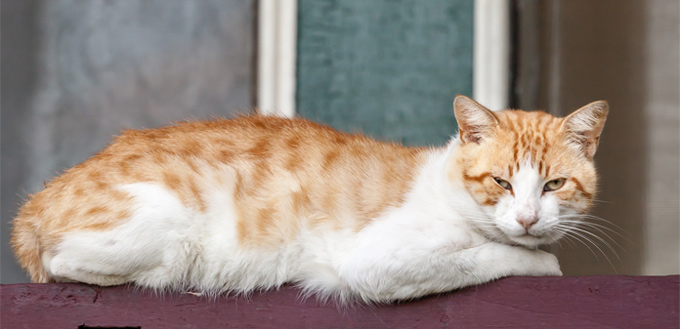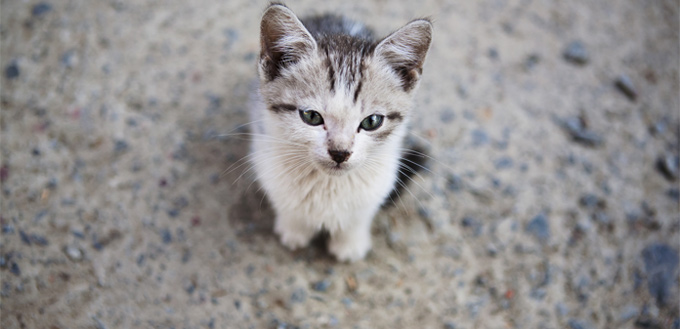Like humans, cats do sometimes lose a bit of weight and look a bit leaner (for example in the summer months when they’re out more and moving around more), but there are a number of medical conditions that can make your cat lose significant weight even when they appear to be eating normally. Any dramatic and seemingly unexplained weight loss in your cat should be investigated by a vet immediately.

Possible Causes of Weight Loss
- Anorexia: Appetite is reduced or has disappeared altogether. Anorexia is extremely dangerous for cats as they are prone to a condition called hepatic lipidosis (fatty liver syndrome), which is caused by the liver having to process large amounts of stored body fat.
- Addison’s disease: An adrenal lack.
- Anxiety/stress/depression: This can be down to too much noise in the environment, foreign animals in your cats feeding area, dirty bowls, food too close to the litter box.
- Cancer: As well as a loss of appetite you may notice your cat is lethargic and is hiding away more than usual.
- Diabetes: (caused either by the body not being able to make insulin, or by its inability to respond to it). You may also notice your cat drinking and urinate more than usual, seeming sluggish, having urinary tract infections and also sweet smelling breath.
- Feline Infectious Peritonitis (FIP): Most common in cattery bred cats, your cat will seem unwell and may have a fever that is untreatable with antibiotics.
- Intestinal parasites (worms): Other symptoms will include diarrhoea, bloating, vomiting and breathing difficulties.
- Gastrointestinal problems: Conditions such as inflammatory bowel disease, blockages, food allergies, and infections. Symptoms may include diarrhoea, lack of appetite, vomiting.
- Organ failure: Particularly in elderly cats, though metabolic changes may mean your cat loses some weight anyway, blood and/or urine tests should be able to isolate the problem.
- Hyperthyroidism: A benign hormone-producing tumour, you may notice increased drinking/urinating, increased activity, diarrhoea, vomiting, muscle wasting and – in the later stages – Heart problems, alongside the weight loss.
- A toothache: Pawing at the mouth and drooling are signs that your kitty has some dental issues (common)
- Neurological conditions: Making it difficult to locate or pick up food.
- Not eating enough: Cat food packaging will tell you how much food to give cats of particular weights. If you’re not sure how much your cat weighs, stand on a bathroom scale with him in your arms, note the weight. Weigh yourself without your cat, note this weight. Take your weight from the combined weight of you and your cat, the remainder is what your cat weighs.
- Food that isn’t fresh/cat doesn’t like: Your cat is unlikely to eat all their food in one go as they like several smaller meals through the day rather than one or two large meals. It should be clear whether your cat is eating all or most of their food, or whether they’re eating hardly anything. You may need to try a few types of food before you find the one your cat really enjoys. Also, don’t leave food down for hours/days expecting your cat to finish it, wet food especially starts to smell and look inviting quite quickly. Keep your cat’s drink bowls and eating area clean and change the food regularly (perhaps consider time restricted or portion restricted feeding.
Related Post: Best Water Bowl for Cats
This is not an exhaustive list of possible conditions that could cause weight loss and obviously many of these conditions have similar symptoms, so do not be tempted to self-medicate your cat as you could do it unintended harm. If you notice any of these symptoms or you have any worries about the health of your cat, take him straight to the vet.
Related Post: Best Cat Litter Box

Treatment
Even in older cats weight loss can be treated, if not cured. Physical checks along with blood and urine tests will allow the problem to be identified and suitable treatment decided upon. A change of diet and/or feeding schedule may be required to enable your cat to live in a relatively healthy state.
Whilst investigations are being carried out appetite-stimulating drugs or feeding tubes can be used to get more nutrition into your pet.
Regular Visits to the Vet
Cats are notoriously private and they are likely to have been unwell for some time before you notice, particularly if they toilet outside rather than in a litter tray in the house (you will not know what their waste is looking like and how often they are going. You may not notice they are drinking more if they have a tendency to drink puddle water outside. Regular visits to your vet (once or twice a year for younger cats, twice a year for older cats and every three months for geriatric cats 14 years plus), will mean that your vet has a record of your cat’s normal weight and other key indicators so that problems can be identified and treated quickly.
Sources:
- Ricardo S. Vasconcellos, Protein Intake During Weight Loss Influences the Energy Required for Weight Loss and Maintenance in Cats, Oxford University Press
- Aki Tanaka, DVM, MPVM, Associations Among Weight Loss, Stress, And Upper Respiratory Tract Infection In Shelter Cats, American Veterinary Medical Association
- Jean Duddy, DVM, Approach to the Anorexic Cat, The MSPCA–Angell
Note: The advice provided in this post is intended for informational purposes and does not constitute medical advice regarding pets. For an accurate diagnosis of your pet's condition, please make an appointment with your vet.






